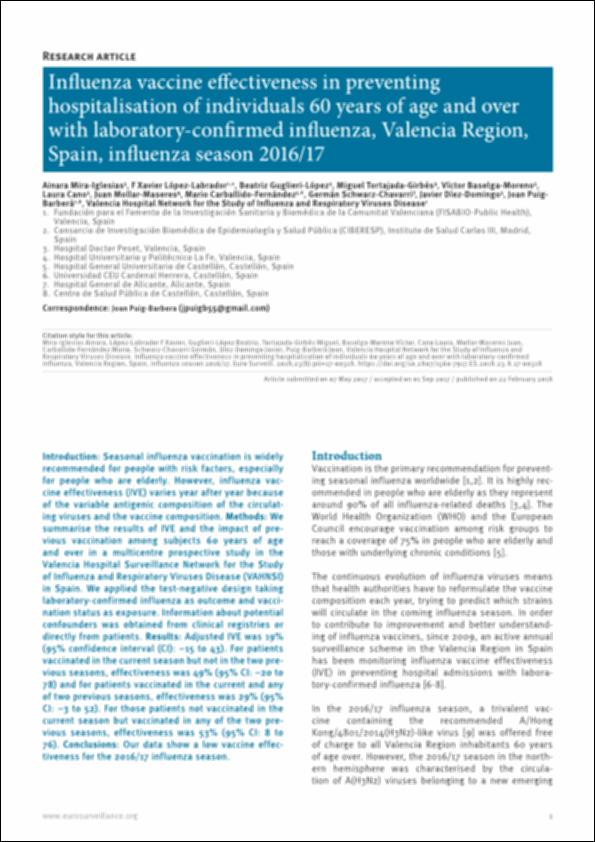Please use this identifier to cite or link to this item:
http://hdl.handle.net/10637/10524Influenza vaccine effectiveness in preventing hospitalisation of individuals 60 years of age and over with laboratory-confirmed influenza, Valencia Region, Spain, influenza season 2016-17
| Title: | Influenza vaccine effectiveness in preventing hospitalisation of individuals 60 years of age and over with laboratory-confirmed influenza, Valencia Region, Spain, influenza season 2016-17 |
| Authors : | Mira Iglesias, Ainara López Labrador, F. Xavier Guglieri López, Beatriz Tortajada Girbés, Miguel Baselga Moreno, Víctor Cano Pérez, Laura Carballido Fernández, Mario |
| Keywords: | Fiebre - Vacunación - España - Comunidad Valenciana.; Older people - Vaccination - Spain - Valencia (Autonomous Community); Ancianos - Vacunación - España - Comunidad Valenciana.; Influenza - Vaccination - Spain - Valencia (Autonomous Community) |
| Publisher: | European Centre for Disease Prevention and Control (ECDC). |
| Citation: | Mira Iglesias, A., López Labrador, FX., Guglieri López, B., Tortajada Girbés, M., Baselga Moreno, V., Cano, L. et al. (2018). Influenza vaccine effectiveness in preventing hospitalisation of individuals 60 years of age and over with laboratory-confirmed influenza, Valencia Region, Spain, influenza season 2016-17. Eurosurveillance, vol. 23 (february), n. 8, pp. 7-15. DOI: https://doi.org/10.2807/1560-7917.ES.2018.23.8.17-00318 |
| Abstract: | Introduction: Seasonal influenza vaccination is widely recommended for people with risk factors, especially for people who are elderly. However, influenza vaccine effectiveness (IVE) varies year after year because of the variable antigenic composition of the circulating viruses and the vaccine composition. Methods: We summarise the results of IVE and the impact of previous vaccination among subjects 60 years of age and over in a multicentre prospective study in the Valencia Hospital Surveillance Network for the Study of Influenza and Respiratory Viruses Disease (VAHNSI) in Spain. We applied the test-negative design taking laboratory-confirmed influenza as outcome and vaccination status as exposure. Information about potential confounders was obtained from clinical registries or directly from patients. Results: Adjusted IVE was 19% (95% confidence interval (CI): −15 to 43). For patients vaccinated in the current season but not in the two previous seasons, effectiveness was 49% (95% CI: −20 to 78) and for patients vaccinated in the current and any of two previous seasons, effectiveness was 29% (95% CI: −3 to 52). For those patients not vaccinated in the current season but vaccinated in any of the two previous seasons, effectiveness was 53% (95% CI: 8 to 76). Conclusions: Our data show a low vaccine effectiveness for the 2016/17 influenza season. |
| Description: | Este artículo se encuentra disponible en la página web de la revista en la siguiente URL: https://www.eurosurveillance.org/content/10.2807/1560-7917.ES.2018.23.8.17-00318 |
| URI: | http://hdl.handle.net/10637/10524 |
| Rights : | http://creativecommons.org/licenses/by/4.0/deed.es |
| ISSN: | 1560-7917. |
| Issue Date: | 1-Feb-2018 |
| Center : | Universidad Cardenal Herrera-CEU |
| Appears in Collections: | Dpto. Medicina y Cirugía |
Items in DSpace are protected by copyright, with all rights reserved, unless otherwise indicated.


